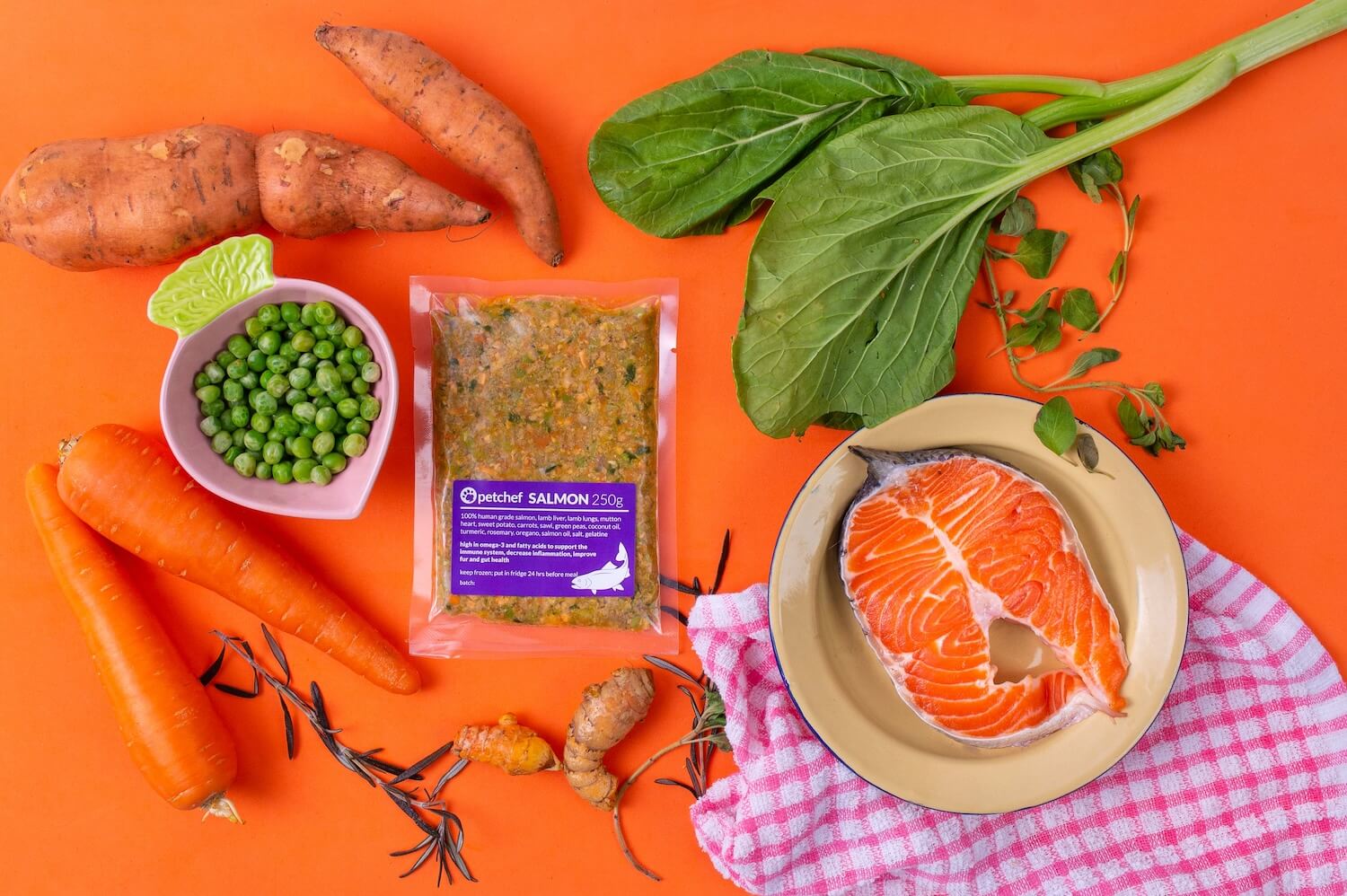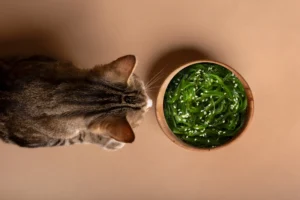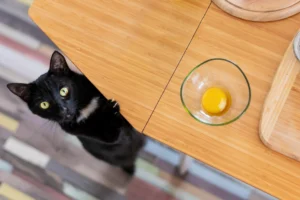Disclaimer: Always check with your vet on what “human foods” your cat can and cannot eat as information may vary based on their dietary needs and health conditions.
You’ve brought home a fresh box or bucket of durians and your cat is either absolutely repelled by the overwhelmingly strong, sulfuric smell or intrigued by it, swiping at the thorns or attempting to steal a nibble of the fruit. As paw-parents, we’d love nothing more than to let our pets experience the world but a question that would probably cross our mind before letting them have a taste is: Can cats eat durian?
Read on to learn more about why your cat may be intrigued or repulsed by durian, can they eat durian and how much they should be eating and more.
Table of Contents
Do cats like durian?
Your cats reactions to durian can vary widely, depending on their individual preferences and tolerance for the fruit’s strong smell and taste:
- Curiosity wins: some cats might be curious and nibble on durian because of its unusual texture and sweet aroma. Cats lack the taste receptors for sweetness, so their interest would come more from curiosity than flavor.
- Repelled by the smell: many cats find durian’s strong, sulfuric smell overwhelming and may actively avoid it. Cats have a keen sense of smell, and durian’s potent odor can be too much for their sensitive noses.
- Neutral reactions: some cats might sniff durian and show no interest at all, treating it as just another strange human food.
However, it should not be a significant part of their diet, as cats are obligate carnivores and require nutrients from animal protein for optimal health.
Is durian safe for cats?
If your cat sneaked a small bite, fret not because durian is technically safe for cats in small amounts. When just given the flesh (without seeds or additives), it can be an occasional treat if your cat really likes durian.
Is durian bad for cats?
Cats require a diet high in animal protein and low in carbohydrates. Durian, being high in sugar and carbs, doesn’t align with their nutritional needs. While cats can eat durian, here’s why it’s not recommended:
Digestive issues
Durian’s richness and fiber content can upset a cat's digestive system, leading to vomiting, diarrhoea, or discomfort.
Lactose content
Durian contains a small amount of lactose, and most cats are lactose-intolerant. This can cause digestive issues.
High sugar and fat
The sugar in durian can contribute to obesity, diabetes, or other health concerns over time.
Choking hazard
The seeds are large and can be a choking or obstruction risk.
Which is why at Petchef, we ensure that all the ingredients that go into your cat’s meal is made for obligate carnivores! All the meals tailored for cats contain:
80% meat (chicken, buffalo, beef, salmon or tuna)
7% vegetables and 3% oils for additional beneficial nutrients
10% Moisture from nourishing broths
It’s completely free of preservatives, additives, fillers and grains! If you’d love for your cat to eat the food they were born to eat, come have a chat with our friendly pet nutritionist to find the ideal meal for your pet
How much durian can a cat eat?
If you decide to give your cat a small taste of durian, only offer a very small amount—about the size of a pea or less, no more than once a week as an occasional treat.
How to tell when a cat has had too much durian?
If your cat has eaten too much durian (or fruit), they may show some digestive symptoms or other signs of discomfort. Here’s what to watch for:
- Digestive upset: diarrhoea, loose stools or vomiting
- Lethargy: your cat seems more tired than usual if their stomach is bothering them
- Reduced appetite: they might avoid food (even their favourite treats) if they’re feeling bloated or nauseous
- Excessive drooling: this can happen if they feel queasy
- Dehydration: they might lose fluids from diarrhoea or vomiting, so watch for signs of dehydration, like dry gums or reduced skin elasticity
- Abdominal pain or discomfort: cats may show signs of discomfort, such as excessive grooming, hiding, or crying when their stomach hurts. They might also tense up or lick their belly more than usual
- Flatulence: excessive gas can be a sign that their digestive system is struggling to process the fruit
If your cat shows any of these signs, keep them hydrated and avoid offering any more fruit or treats for a day or two. If symptoms are severe or don’t resolve within 24 hours, it’s best to consult your vet for advice.
How often can cats eat durian?
Cats can enjoy durian as an occasional treat, ideally no more than once a week. Since cats are obligate carnivores, their digestive systems aren’t designed to process fruits regularly. Here are some tips for offering bananas in moderation:
Limit treats to 10% of total diet
Treats, including durians, should make up no more than 10% of their total daily calories.
Balance variety
If your cat enjoys other safe treats, consider rotating them to avoid offering fruit too frequently.
If your cat seems to tolerate fruit well, giving them a small amount occasionally is a nice way to add variety—just remember to keep the portions small and infrequent.
How to feed your cat durian?
To safely feed your cat durian, follow these steps
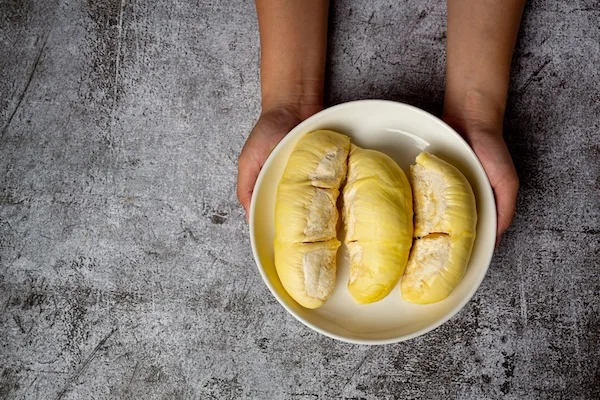
Peel away the thick, spiky shell and avoid any areas of the durian that may have been contaminated or overly ripe. Only give the soft, yellow flesh.

Never give your cat durian seeds. They are large, hard, and pose a choking hazard or could cause intestinal blockages. Only offer the flesh of the fruit.
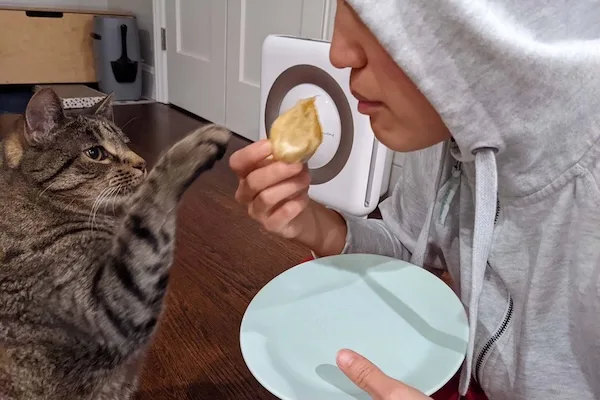
Offer only a very small piece — about the size of a pea or smaller. Cats are obligate carnivores, so their digestive system isn’t designed for fruits like durian.
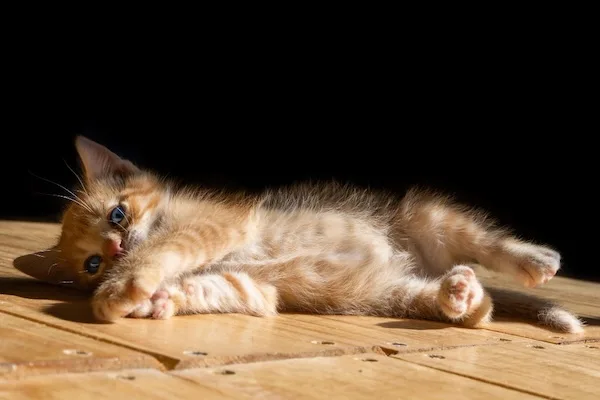
After offering a small piece of durian, watch for any signs of discomfort, such as vomiting, diarrhoea, or lethargy. This will help you gauge whether durian agrees with your cat.




